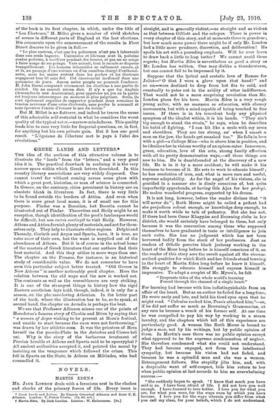GREEK LANDS AND LETTERS.*
THE idea of the authors of this attractive volume is to illustrate the " lands " from the "letters," and a very good idea it is. The practical drawback in realising it is the very narrow space within which Greek letters flourished. In this country literary associations are very widely dispersed. One cannot travel far without coming across some place with which a great poet, historian, or man of science is connected. In Greece, on the contrary, cities prominent in history are an absolute blank in literature. In fact, there is very little to be found outside the borders of Attica. And even when there is some great local name, it is of small use for this purpose. Pindar was a Boeotian, but Boeotia cannot be illustrated out of Pindar. Theocritus and Sicily might be an exception, though identification of the poet's landscapes would be difficult, but non minis contingit to visit Sicily. However, Athens and Attica furnish plenty of materials, and not for them- selves only. They help to illustrate other regions. Delphi and Thessaly, Corinth and Argos and Sparta, have, it is true, no vates sacer of their own, but the want is supplied out of the abundance of Athens. But it is of course in the actual home of the masters of Greek literature that our authors find their best material. And this they utilise in more ways than one. The chapter on the Piraeus, for instance, is an historical study of considerable value. We do not remember to have seen this particular subject better treated. " Old Greece in New Athens " is another noticeably good chapter. Here the relation between the old ways and the new is worked out. The contrasts as well as the resemblances are very striking. It is one of the strangest things in history how the rigid Eastern asceticism lays hold, though, indeed, it is only for a season, on the pleasure-loving Athenian. In the latter part of the book, where the illustration has to be, so to speak, at second hand, the chapter on Arcadia is perhaps the best.
We see that Professor Allinson misses one of the points of Herodotus's famous story of Cleobis and Biton by saying that " a woman of Argos wishing to be present at Hera's festival, and unable to start because the oxen were not forthcoming," was drawn by her athletic sons. It was the priestess of Hera herself (as the pseudo-Plato in the Axiochus and Cicero tell us). Why is the story of the barbarous treatment of Persian heralds at Athens and Sparta said to be apocryphal P All ancient authorities accepted it, and pointed the moral by insisting on the vengeance which followed the crime. This fell in Sparta on the State, in Athens on Miltiades, who had counselled it.






































 Previous page
Previous page